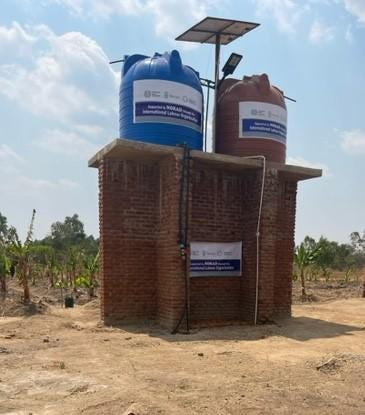ILO's Work Integrated Learning Program Boosts Youth Employment in Malawi
Kayira expressed gratitude to ILO for donating the solar-powered irrigation system to the farm, emphasizing its importance for irrigation.
LILONGWE, Malawi—Principal Secretary for the Ministry of Labour, Wezi Kayira, has commended the International Labour Organisation (ILO) for its support in promoting a responsive labour market that encourages skills development, lifelong learning, and access to decent employment opportunities for Malawi's youth through the Work Integrated Learning (WIL) program, writes Lewis Msasa.
Speaking on Friday during the official handover of a solar-powered irrigation system worth approximately K10 million to Amazing B Farm in Lilongwe, Kayira praised the WIL program for equipping young people with practical skills in horticulture enterprises.
Kayira explained, "WIL refers to an approach to career-focused training that includes both classroom-based and workplace-based methods. This initiative is part of our effort to integrate Agriculture Technical and Vocational Education and Training (Agri-TVET) into the Technical, Entrepreneurial, and Vocational Education and Training (TEVET) sector. If well managed, the program has great potential to provide young people with practical horticultural skills for productive employment."
He highlighted the success story of Clara Kamlomo, the owner of Amazing B Farm and a graduate of the WIL program through the Natural Resources Campus of the Lilongwe University of Agriculture and Research (LUANAR), as evidence of the program's effectiveness.
Kayira also mentioned plans to incorporate the Recognition of Prior Learning (RPL) program into Agri-TVET, ensuring that even individuals who did not attend formal training institutions have the opportunity to acquire formal qualifications.
Kayira expressed gratitude to ILO for donating the solar-powered irrigation system to the farm, emphasizing its importance for irrigation.
In his remarks, Wellington Chibebe, ILO Country Director responsible for Zambia and Mozambique, highlighted that the WIL program in Malawi, implemented by the government, is based on two studies conducted by ILO in 2013.
He explained, "The Enabling Environment for Sustainable Enterprise (EESE) study revealed that the skills training and development system is not well aligned with industry needs and economic growth, while the School-to-Work Transition Survey noted that qualifications mismatch is high in Malawi, with many young workers being undereducated for the work they do. With financial support from the Government of Norway, the WIL program was conceived as an action-learning intervention to address the challenge of skills mismatch."
Chibebe expressed satisfaction that Amazing B Farm had created direct employment for five young people and had empowered over 1,000 individuals with skills in forestry-based and horticulture enterprises.
He pledged ILO's continued support for various initiatives aimed at promoting decent employment opportunities for the youth.
Clara Kamlomo, the farm owner, expressed her gratitude for the irrigation system, which would address water challenges on her farm. She called on ILO to replicate the initiative in other areas to ensure that more young people benefit from the program.
According to ILO National Coordinator Patrick Makondesa, the WIL program is spearheaded by the Ministry of Labour, the TEVET Authority, the Employers Consultative Association of Malawi, the Malawi Congress of Trade Unions, LUANAR, and companies in Blantyre, Lilongwe, and Mzuzu.



